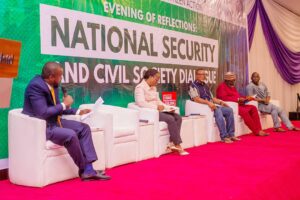The maiden edition of Evening of Reflections, tagged National Security and Civil Society Dialogue in Nigeria, united stakeholders from both civil society and security agencies to discuss how national security policies and measures, especially those framed around the objectives of anti-money laundering (AML) and countering the financing of terrorism (CFT), impact the operating space for civil society in Nigeria. The event held in Abuja on March 23, 2023, had over 100 participants in attendance, including members and leaders of the nonprofit sector, security agencies, academia, members of the press, and policymakers.
In her opening remarks, the executive director of Spaces for Change | S4C reiterated the organization’s commitment to fostering collaboration and building trust between civil society and security agencies in Nigeria. S4C has carried out extensive research to deepen understanding of the intersection between security and human rights. The organization’s research findings have laid the foundation for engagement, with the result that discussions that were hitherto challenging are now “softening into constructive and sustained dialogues between law enforcement agencies and civil society groups”. S4C’s 2019 research publication, “Unpacking the Official Construction of Risks and Vulnerabilities for the Third Sector in Nigeria,” interrogated the results of the national risk assessment (NRA) of money laundering and terrorist financing in Nigeria conducted in 2016 which lumped NPOs together with other businesses and professions. The findings of that research opened the doors to increased cooperation between regulators and NPOs, which ultimately culminated in the government’s decision to conduct a participatory and separate NRA for the non-profit sector.
Nothing illustrates this growing collaboration more than the active participation of civil society organizations (CSOs), including the International Non-Governmental Organization (INGO) community, in the ongoing national risk assessment exercise. Law enforcement departments like the Special Control Unit against Money Laundering (SCUML) have also delivered training programs to non-profit organizations (NPOs), reviewed registration and reporting requirements, delisted the NPO sector from the list of designated non-financial businesses and professions (DNBPs) under the Money Laundering Act of 2022, and conducted inspection tours in collaboration with NPO coalitions. An NPO regulation is being developed to enable Nigeria to exit the Financial Action Task Force (FATF) grey list. This regulation provides a legal framework for the activities of nonprofit organizations in Nigeria, ensuring compliance with international standards while promoting transparency and accountability.
Participants at the event were thrilled to a video documentary, titled, “Celebrating Courage in Difficult Times,” which emphasized the critical role played by pioneering leaders of civil society in birthing Nigeria’s 21-year-old uninterrupted democratic rule. The documentary recognized the sacrifices of several civil society leaders like Clement Nwankwo, Olisa Agbakoba, Abdul Oroh, Beko Ransome-Kti, Innocent Chukuma, Nkoyo Toyo, Joy Ezeilo, Nkoyo Toyo and others whose struggled laid the foundation for the organized civil society in Nigeria today.
As the documentary showed, the civil society sector has fought to promote democracy, socio-economic development, and a free civic space. In other words, civil society organizations and the government have been allies in the government’s fight against corruption, money laundering (ML), and terrorism financing (TF) even long before the return to democratic rule in 1999. The documentary and story-telling sessions shed light on the contributions of the civil society sector to national security, human rights, and democracy in Nigeria. After watching the documentary and personal stories of courage by pioneer civil society leaders during the ruthless military junta, a panel discussion ensued between civil society leaders, regulators and security agents. The discussions highlighted the importance of recognizing that human rights and national security are interdependent and mutually reinforcing objectives. Panelists also praised the critical role S4C is playing in the standalone national risk assessment of the nonprofit sector.
The highlight of the event was the recognitions and award presentations to CSO leaders like Clement Nwankwo, Abdul Oroh, John Odah, and Y.Z. Yau who demonstrated unbeatable courage in the face of the difficulties faced by civil movements during military rule. During a fireside chat with Clement Nwankwo, pioneer activist, Executive Director of Policy and Legal Advocacy Centre (PLAC) and a recipient of the courage award, he observed that the challenges confronting activism today are akin to those experienced during the military regime. Drawing a comparison between the 1993 general elections and the recent 2023 general and gubernatorial elections, he contended that leaving politics to politicians after the country’s democratization in 1999 was a major flaw that the next generation of civil society leaders should correct. He urged future civil society leaders to learn from their mistakes. Spaces for Change organized the first edition of the Evening of Reflections with support from the Fund for Global Human Rights.




